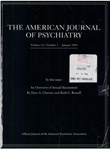Assessing competency to make a will
Abstract
The finding by a court that the author of a will (the testator) lacked mental capacity or was subject to undue influence at the time the will was executed can invalidate the will. A psychiatrist may be asked to assess the competency of a testator when he or she is planning to create or modify a will or after the death of a testator when the will is challenged. To provide guidelines for such evaluations, the authors reviewed the relevant psychiatric, forensic, and legal literature and drew on their own professional experience as well. They outline a systematic approach to the contemporaneous and retrospective evaluation of the elements that affect decisions about mental capacity and undue influence and offer suggestions for the organization and presentation of expert testimony. Awareness of the relevant legal principles and a systematic clinical approach to the assessment can maximize the quality of the psychiatric consultation and expert testimony.
Access content
To read the fulltext, please use one of the options below to sign in or purchase access.- Personal login
- Institutional Login
- Sign in via OpenAthens
- Register for access
-
Please login/register if you wish to pair your device and check access availability.
Not a subscriber?
PsychiatryOnline subscription options offer access to the DSM-5 library, books, journals, CME, and patient resources. This all-in-one virtual library provides psychiatrists and mental health professionals with key resources for diagnosis, treatment, research, and professional development.
Need more help? PsychiatryOnline Customer Service may be reached by emailing [email protected] or by calling 800-368-5777 (in the U.S.) or 703-907-7322 (outside the U.S.).



